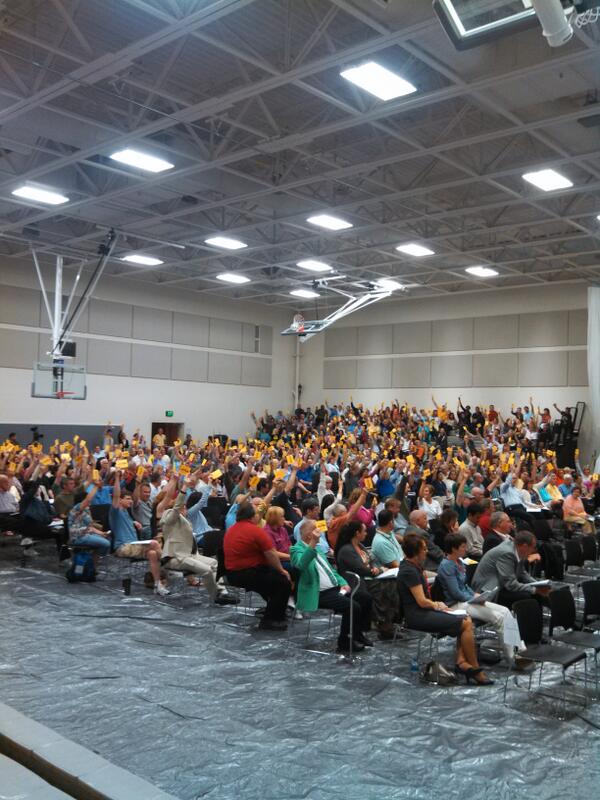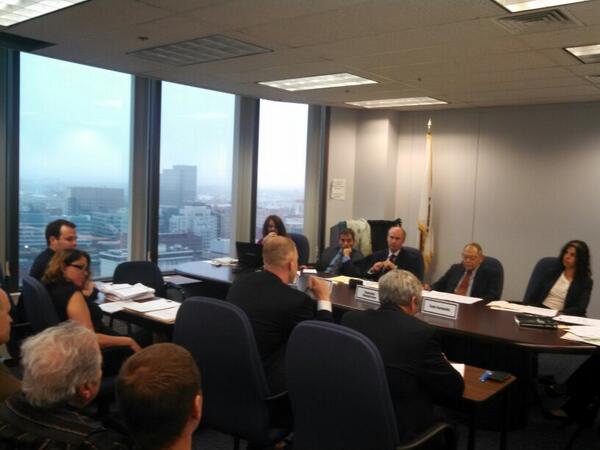Longmeadow and the Valley Conquered, Clark Turns Gaze East…
UPDATED 12/15/14 5:44PM: For grammar and clarity.

Senator-elect Eric Lesser (right) with Campaign Manager Michael Clark (via Facebook/Lesser campaign)
LONGMEADOW—Sometimes, life imitates art.
The Lesser Committee campaign manager Michael Clark said he had recently finished up the seventh season of The West Wing and noted the episode after fictional US Representative Matthew Santos won the presidency. All the characters appeared absolutely exhausted. Clark can relate.
“It’s a huge relief,” said Clark, a vet of winning and losing bids. “The next day is such a huge relief.”
Clark, vice-chair of the Longmeadow School Committee, led former White House aide Eric Lesser to a convincing win last month to fill the seat vacated by Gale Candaras. That victory as Lesser’s campaign manager—and before that as field director—fortified the 25 year-old’s ascent within town and regional politics and offers a chance to act on an even larger stage.
Lesser, in a statement, called Clark “an invaluable campaign manager,” who “works incredibly hard, and has a strong belief in the power of public service to help people.”

Clark is expected to join Lesser in Boston in an as yet unannounced capacity. (Image via wikipedia & Facebook)
Eighteen months ago at Town Meeting, the School Committee—which Clark then chaired—successfully overturned Select Board cuts to schools. His preferred candidate later defeated an incumbent selectman with Clark’s influence rippling into town elections this year.
Lee Morrow, who served as campaign manager until the primary when he returned to school, said Clark “brought many important connections—his Longmeadow political base—with him when we chose him to be field director.” The transition from Morrow to Clark in the general election was “seamless.”
Speaking to WMassP&I at Starbucks here, Clark reminisced about the senate campaign and his trajectory in politics. Clark said he always identified as a Democrat, suggesting that the president of one’s youth—in his case Bill Clinton—has an impact on political orientation.
Longmeadow Democratic Town Chair Candy Glazer nurtured Clark’s political career, as she did for Lesser. However, Lesser had the override battle under his belt before even graduating high school. Clark was a junior at UMass-Amherst by the time he began working on campaigns in earnest.

Longmeadow residents casting their votes in support of the School Committee’s proposal to transfer funds to preserve programming. (WMassP&I)
In 2010 he became active in the LDTC, ran for Select Board (placing third in a race for two seats), and worked on a district attorney campaign. The next year he secured a School Committee seat, followed by more campaigns including the 2012 reelection effort of close friend and supporter Rep. Brian Ashe.
“Brian was a known quantity,” Clark said. Voters “knew him and liked him.” Still, that race was a game of defense. Selectwoman Marie Angelides put up a good fight, which earned her Clark’s respect.
Lesser’s election to an open seat was entirely different. Not only were the stakes high amid a heated and close gubernatorial election, but Clark had more to gain—or lose.
Clark had been itching to go into politics professionally. Yet he hesitated at trading his job at a recycling company for a campaign’s uncertainty, passing on an earlier offer from Lesser. After further discussions, Clark took the plunge and put in his notice. As Lesser staffed up, he hired Clark as field director, leading data and ground operations, which the senator-elect hailed as “very skillfully executed.”
Clark noted that Lesser assured the campaign would not be a “ramshackle” effort—and it wasn’t. “He knew exactly what he wanted to do,” Clark said of Lesser.

The State Ballot Law Commission hearing on Lesser’s residency. The body ruled unanimously that he was eligible to run. (WMassP&I)
However, there was a defining moment of doubt for Clark shortly after signing on. He gestured to a nearby table where he was sitting, drawing up the field plan when he heard Tim Allen had challenged Lesser’s candidacy. At that moment, Clark recalled thinking, “What did I do?”
Lesser was quick to reassure his team. “Eric sat Lee and me down, he was very clear.” The residency process “will not be pleasant, but I promise we will be okay.” Lesser indicated in his hearing that he knew the law to be on his side and obviously he prevailed.
The close result in the primary heightened the pressure in the general along with the unknown impact of Lesser’s ties to the President (from whom Lesser never distanced himself) in a swing district.
With all that over, “It just feels different,” Clark said. “No pressing need to go full speed ahead.”

Lesser sharing a lighthearted(?) moment with then-boss David Axelrod, who was one of President Obama’s top advisers in the White House from 2009-2011. (via NY Times/Doug Mills)
The interplay between Lesser and Clark, especially as campaign manager, occasionally evoked Lesser and his old boss David Axelrod. Axelrod and Lesser’s comedic relationship of conflicting personalities belying a true partnership was compared to The West Wing‘s Josh Lyman and Donna Moss.
Clark-Lesser has evinced an element of that Sorkinese thrust and parry. When Lesser would solemnly thank supporters, Clark might puncture the moment with a bit of humor, sometimes at Lesser’s expense. But in private, Clark also let Lesser vent frustrations about the campaign as a friend.
Sources say this dynamic is cued up to continue with Clark playing a major role in Lesser’s office. Clark declined to speculate what it would be and Lesser, calling Clark “a close friend and a trusted adviser,” said he “will continue to play a significant role moving forward.” A formal announcement is expected.
Teased about professionalizing his preferred style—sandals (weather permitting), jeans and plaid button-down shirts—Clark, acknowledged the ribbing from friends and the vast peanut gallery on Masslive. “I’m buying suits,” he assured.
Despite being coy about his role in the future, working in Boston is an immense leap for Clark. While responsible for policy on the School Committee now and influential in town affairs generally, the legislative process on Beacon Hill will involve a wide swath of issues affecting the entire state.
The prospect of turning campaign promises—rail and retaining talent among others—is exciting, if also daunting. “I don’t think anybody’s kidding themselves that we will have to work very hard,” he said.

Lee Morrow, Clark’s predecessor as campaign manager. Morrow handed the campaign over to Clark after the primary to return to school. (via Facebook/non-campaign)
Clark “has proven that his political skills give him reach beyond Longmeadow,” Morrow said and expects Boston to be “another arena to use those skills.” “I know he’s up to the task.,” Morrow added.
Asked if this was where he envisioned himself, Clark did not answer directly, “The opportunities I have are to work on Beacon Hill to get a lot of good stuff done for Eric and for the district.” Clark acknowledged it will require personal, professional and mental investment and observed he, Morrow and other staffers put their lives on hold and sacrificed relationships for this campaign.
Defending public service generally—another theme of Lesser’s campaign—Clark said a positive impact on people, however small, is important. “When you get to do something on a local board or at Congress, even if you are on constituent work, you make the difference for them. That’s a cool thing to do.”
During the interview, a woman asked Clark if he was moving to Boston. As he had told WMassP&I, Clark assured her he was staying put. That will mean juggling the School Committee and whatever he does for Lesser in Boston. There is a model for this. Aaron Saunders, one of Lesser’s primary opponennts, sought and won a Ludlow Select Board seat while in Candaras’ employ.
“I love this community,” Clark said. Referencing his post in Longmeadow, but also alluding to his place in the district’s broader community, he added, “I’m certainly not going to be giving that up just yet.”